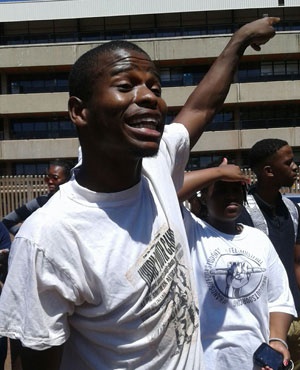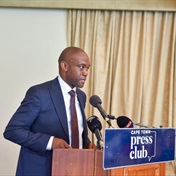
The National Student Financial Aid Scheme (Nsfas) will go after beneficiaries who have failed to pay back their study loans by using the National Credit Act.
In other words, young black graduates will be blacklisted.
According to Nsfas chairperson Sizwe Nxasana, this will help the scheme recover R21 billion in loans owed to it.
This while the Fees Commission continues to look into the “feasibility of free higher education”.
No wonder student organisations such as the Economic Freedom Fighters’ Students’ Command and the Pan Africanist Student Movement of Azania withdrew from participating in the commission; and no wonder it was generally met with hostility from members of the Fees Must Fall movement.
All government-sanctioned commissions that have come before – from the Arms Procurement Commission of Inquiry to the recent Marikana Commission – have exonerated key political figures from responsibility and provided no justice or satisfactory outcomes.
Importantly, the question of higher education is not a judicial one, but a policy one.
Generally, basic education at South Africa’s public schools is inadequate, especially for blacks and the poor, with many schools failing to meet the minimum standards of quality education.
Against this background, understandably, poor black students entering university face difficulties.
Despite South Africa’s history of racial discrimination, universities continue to replicate inequality and privilege.
The problems students face to access higher education – and the struggle for free, quality and decolonised learning – are fundamentally about the reconstruction of post-apartheid South Africa into a more equitable society.
I am a beneficiary of Nsfas and it works this way: To obtain funding, I had to ask my mother, who is a domestic worker, to request an affidavit from her white employers confirming that she was their employee and that they paid her R150 a day – amounting to R3 000 a month.
In addition to enduring the annual embarrassment of standing in long queues at the Nsfas offices to prove I was poor, the struggle to get accommodation close to campus was a nightmare for many black students like me.
The reason students received financial aid was because of their socioeconomic circumstances, which do not miraculously change when they earn a salary or stipend.
In his submission to the Fees Commission, Ntuthuzo Ndzomo, the deputy general secretary for equal education, encapsulated the black graduate’s predicament.
“I am the only one from my own home who went to university. My income is not my own income; it is my family’s income. Circumstances are quite important, and we cannot run away from them,” he said.
The burden of the black graduate is that he or she would naturally be expected to alleviate some of the burden of poverty on their family.
These conditions remain after the student graduates. Many of them, who have job-hunted for months, end up becoming back yard dwellers at their parents’ home.
The cost of an average year of study at the University of the Witwatersrand amounts to R30 000, excluding residence fees.
This means a four-year degree without accommodation can easily cost R120 000. According to Nxasana, a graduate on a R30 000-a-year internship would be expected to pay R900 annually – to clear a debt totalling more than R120 000 – for at least 11 years.
So, blacklisting black graduates is condemning them to poverty.
Government and universities have reduced the demand for free quality and decolonised higher education to “cost” – a cost which the individual student is liable for, not society as a whole.
Universities have been reduced to this factor, to such an extent that cleaning, gardening and kitchen staff at universities are outsourced mostly to white, privately owned companies that exploit the structural unemployment of black people to reduce operational costs to the universities.
Free quality and decolonised education is possible without bullying already poor graduates and sentencing them to more poverty.
This is possible if education is viewed not only as the student’s responsibility but also as part of society’s role to advance its development.
We cannot condemn poor graduates without questioning why vice-chancellors can earn as much as R250 000 a month, and get personal chefs and accommodation paid by the university, when no sufficient, affordable accommodation for poor students is provided.
In addition, it cannot be that government spends about R158.6 million on the salaries of 35 ministers and 37 deputies when students are deprived annually because they are poor.
Given that higher education in South Africa is supposed to play a crucial role in our socioeconomic and political transformation as a collective, costs should not rest on the individual student alone.
Nhlapo, a former Wits University student, works as a researcher for the Economic Freedom Fighters in the Gauteng legislature
TALK TO US
Do you think companies and citizens should pay an education stipend?
SMS us on 35697 using the keyword STUDENTS. Please include your name and province. SMSes cost R1.50




 Publications
Publications
 Partners
Partners























